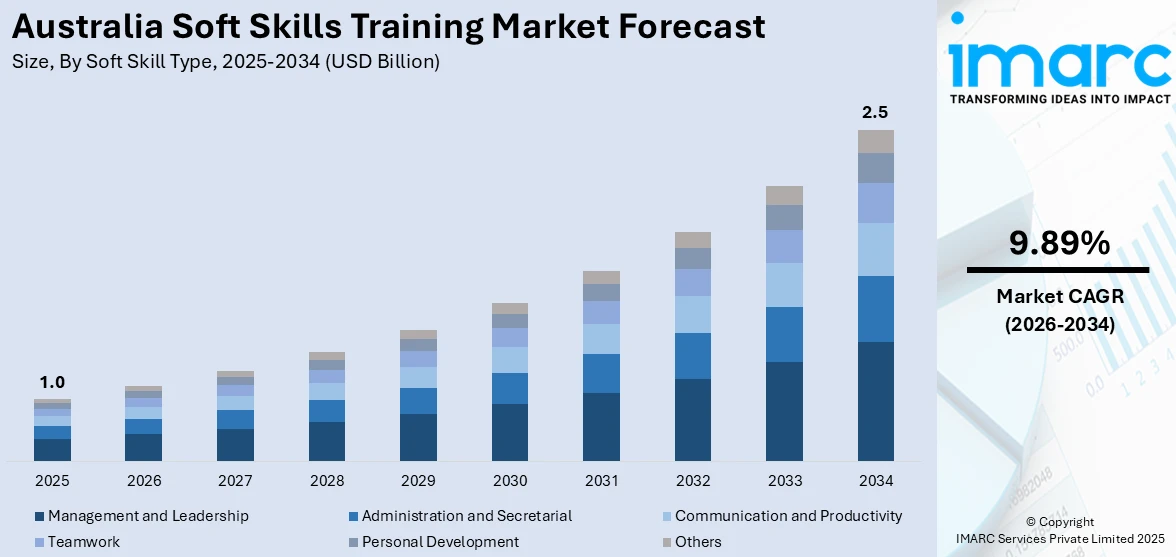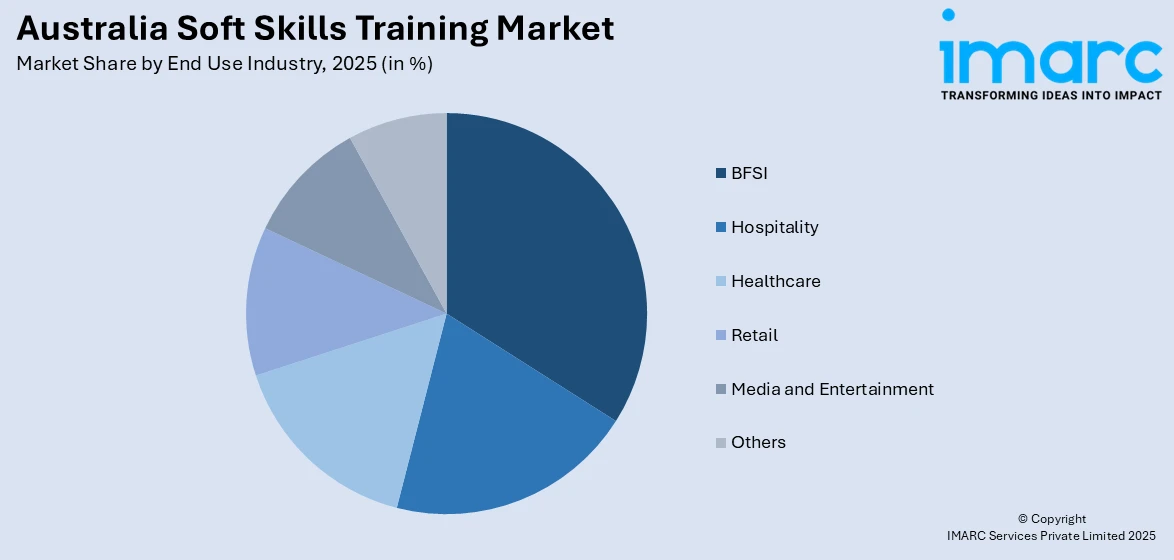
Australia Soft Skills Training Market Size, Share, Trends and Forecast by Soft Skill Type, Channel Provider, Sourcing, Delivery Mode, End Use Industry, and Region, 2026-2034
Australia Soft Skills Training Market Overview:
The Australia soft skills training market size reached USD 1.0 Billion in 2025. Looking forward, IMARC Group expects the market to reach USD 2.5 Billion by 2034, exhibiting a growth rate (CAGR) of 9.89% during 2026-2034. The market is growing due to rising demand for workplace communication, leadership development, and team collaboration. Corporate investment in employee development and government support for vocational training further encourage this market’s steady expansion across industries.
|
Report Attribute
|
Key Statistics
|
|---|---|
|
Base Year
|
2025 |
|
Forecast Years
|
2026-2034
|
|
Historical Years
|
2020-2025
|
| Market Size in 2025 | USD 1.0 Billion |
| Market Forecast in 2034 | USD 2.5 Billion |
| Market Growth Rate 2026-2034 | 9.89% |
Australia Soft Skills Training Market Trends:
Rising Emphasis on Employee Communication
Companies in Australia are increasingly focusing on improving employee communication as part of broader workplace development strategies. The shift towards remote and hybrid work models has highlighted the need for clear interpersonal interactions, prompting firms to prioritize soft skills alongside technical abilities. Employers across sectors now view communication, empathy, and emotional intelligence as essential to team productivity and cohesion. This growing emphasis has led to higher adoption of training programs targeting active listening, conflict resolution, and presentation skills. Industries like finance, healthcare, and customer service are particularly proactive in integrating such training modules. Multinational corporations and local enterprises are investing in customized workshops and e-learning platforms to enhance internal communication frameworks. As a result, demand is rising for certified trainers and organizations offering tailored modules. In the second half of 2023, several training providers launched flexible virtual programs that helped businesses accommodate learning without disrupting daily operations. Additionally, rising multiculturalism in Australian workplaces has led to a push for cross-cultural communication training. These developments reflect a strong trend: employers are actively bridging soft skills gaps to improve team dynamics and long-term performance outcomes.

To get more information on this market Request Sample
Growing Focus on Leadership Development
Leadership development is becoming a core part of professional training strategies in Australia. As businesses face rapidly changing markets and evolving employee expectations, they are emphasizing the cultivation of adaptable and empathetic leaders. Organizations now recognize that technical expertise alone is not enough; managers must also inspire, engage, and support their teams. This shift is most evident in middle and senior management development programs. Training in decision-making, emotional regulation, and motivational leadership is gaining momentum across industries such as IT, construction, education, and retail. The Australian government’s push for skill-based learning, especially in vocational sectors, also includes modules for leadership and people management. By late 2023, many companies had integrated mentoring models and peer-led coaching as part of ongoing professional development. Microlearning apps and modular training programs are being widely adopted for their flexibility and scalability. Moreover, employee feedback systems are being used to design leadership programs that reflect actual workplace challenges. These newer approaches have contributed to a deeper alignment between company goals and leadership training content. The trend signals a steady shift toward building resilient, people-focused leaders capable of handling today’s workplace demands.
Australia Soft Skills Training Market Segmentation:
IMARC Group provides an analysis of the key trends in each segment of the market, along with forecasts at the country level for 2026-2034. Our report has categorized the market based on soft skill type, channel provider, sourcing, delivery mode, and end use industry.
Soft Skill Type Insights:
- Management and Leadership
- Administration and Secretarial
- Communication and Productivity
- Teamwork
- Personal Development
- Others
The report has provided a detailed breakup and analysis of the market based on the soft skill type. This includes management and leadership, administration and secretarial, communication and productivity, teamwork, personal development, and others.
Channel Provider Insights:
- Corporate/ Enterprise
- Academic/ Education
- Government
A detailed breakup and analysis of the market based on the channel provider have also been provided in the report. This includes corporate/ enterprise, academic/ education, and government.
Sourcing Insights:
- In-house
- Outsourced
A detailed breakup and analysis of the market based on the sourcing have also been provided in the report. This includes in-house and outsourced.
Delivery Mode Insights:
- Online
- Offline
A detailed breakup and analysis of the market based on the delivery mode have also been provided in the report. This includes online and offline.
End Use Industry Insights:

Access the comprehensive market breakdown Request Sample
- BFSI
- Hospitality
- Healthcare
- Retail
- Media and Entertainment
- Others
A detailed breakup and analysis of the market based on the end use industry have also been provided in the report. This includes BFSI, hospitality, healthcare, retail, media and entertainment, and others.
Regional Insights:
- Australia Capital Territory & New South Wales
- Victoria & Tasmania
- Queensland
- Northern Territory & Southern Australia
- Western Australia Canada
The report has also provided a comprehensive analysis of all the major regional markets, which include Australia Capital Territory & New South Wales, Victoria & Tasmania, Queensland, Northern Territory & Southern Australia, and Western Australia.
Competitive Landscape:
The market research report has also provided a comprehensive analysis of the competitive landscape. Competitive analysis such as market structure, key player positioning, top winning strategies, competitive dashboard, and company evaluation quadrant has been covered in the report. Also, detailed profiles of all major companies have been provided.
Australia Soft Skills Training Market News:
- November 2024: NIDA Corporate Training introduced its course “How to Be Human,” focused on communication skills in the AI era. The program addressed declining workplace connection, boosting demand for customized soft skills training across Australian businesses adapting to digital change.
- May 2024: Argon & Co launched its Academy in Australia and New Zealand, offering programs that included soft skills training in leadership, coaching, and governance. The initiative expanded the firm’s services and strengthened the region’s focus on workforce development and operational transformation through continuous learning.
Australia Soft Skills Training Market Report Coverage:
| Report Features | Details |
|---|---|
| Base Year of the Analysis | 2025 |
| Historical Period | 2020-2025 |
| Forecast Period | 2026-2034 |
| Units | Billion USD |
| Scope of the Report |
Exploration of Historical Trends and Market Outlook, Industry Catalysts and Challenges, Segment-Wise Historical and Future Market Assessment:
|
| Soft Skill Types Covered | Management and Leadership, Administration and Secretarial, Communication and Productivity, Teamwork, Personal Development, Others |
| Channel Providers Covered | Corporate/ Enterprise, Academic/ Education, Government |
| Sourcings Covered | In-house, Outsourced |
| Delivery Modes Covered | Online, Offline |
| End Use Industries Covered | BFSI, Hospitality, Healthcare, Retail, Media and Entertainment, Others |
| Regions Covered | Australia Capital Territory & New South Wales, Victoria & Tasmania, Queensland, Northern Territory & Southern Australia, Western Australia |
| Customization Scope | 10% Free Customization |
| Post-Sale Analyst Support | 10-12 Weeks |
| Delivery Format | PDF and Excel through Email (We can also provide the editable version of the report in PPT/Word format on special request) |
Key Questions Answered in This Report:
- How has the Australia soft skills training market performed so far and how will it perform in the coming years?
- What is the breakup of the Australia soft skills training market on the basis of soft skill type?
- What is the breakup of the Australia soft skills training market on the basis of channel provider?
- What is the breakup of the Australia soft skills training market on the basis of sourcing?
- What is the breakup of the Australia soft skills training market on the basis of delivery mode?
- What is the breakup of the Australia soft skills training market on the basis of end use industry?
- What are the various stages in the value chain of the Australia soft skills training market?
- What are the key driving factors and challenges in the Australia soft skills training market?
- What is the structure of the Australia soft skills training market and who are the key players?
- What is the degree of competition in the Australia soft skills training market?
Key Benefits for Stakeholders:
- IMARC’s industry report offers a comprehensive quantitative analysis of various market segments, historical and current market trends, market forecasts, and dynamics of the Australia soft skills training market from 2020-2034.
- The research report provides the latest information on the market drivers, challenges, and opportunities in the Australia soft skills training market.
- Porter's five forces analysis assist stakeholders in assessing the impact of new entrants, competitive rivalry, supplier power, buyer power, and the threat of substitution. It helps stakeholders to analyze the level of competition within the Australia soft skills training industry and its attractiveness.
- Competitive landscape allows stakeholders to understand their competitive environment and provides an insight into the current positions of key players in the market.
Need more help?
- Speak to our experienced analysts for insights on the current market scenarios.
- Include additional segments and countries to customize the report as per your requirement.
- Gain an unparalleled competitive advantage in your domain by understanding how to utilize the report and positively impacting your operations and revenue.
- For further assistance, please connect with our analysts.
 Request Customization
Request Customization
 Speak to an Analyst
Speak to an Analyst
 Request Brochure
Request Brochure
 Inquire Before Buying
Inquire Before Buying




.webp)




.webp)












